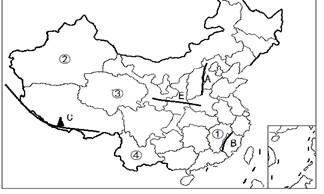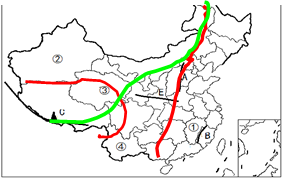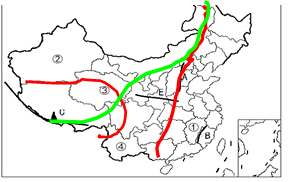问题
综合
读中国轮廓图,回答下列问题。(8分)


(1)填出图中字母表示的山脉或山峰的名称:(2分)
A____________山脉;B____________山脉;C____________山脉;E 山脉。
(2)填出图中序号表示的省级行政区的全称:(2分)
①________________;②________________;③_______________;④_______________。
(3)图中E山脉与淮河组成了我国非常重要的地理分界线,是我国1月________℃等温线穿过的地方,是我国________毫米等降水量线经过的地方。(1分)
(4)在图中用实线画出第一、二阶梯,第二、三阶梯的分界线。(2分)
(5)在图中用虚线画出季风和非季风的分界线。(1分)
答案
(1)太行山 武夷山 珠穆朗玛峰 秦岭
(2)江西省 新疆维吾尔自治区 青海省 云南省
(3)0 800
(4)红色曲线

(5)绿色曲线

题目分析:(1)根据A所处的位置,以及山脉的走向可以判断,A是太行山;B是东北西南走向,根据位置可以判断B是武夷山,C处在喜马拉山的主峰的位置,所以是珠穆朗玛峰;E是东西走向,横亘在东部地区的中间位置,所以可以判断E是秦岭。
(2)根据轮廓和相对位置可以判断,①是江西省;②是新疆维吾尔自治区;③是青海省;④云南省。
(3)秦岭-淮河一线是重要的地理分界线,所在地区大致经过0℃等温线,接近于800mm等降水量线;
(4)

(5)见如图绿线。
